FNCA Mutation Breeding Sub-Project Meeting on Disease Resistance in Banana took place as follows:
| Date : |
30 June - 3 July 2008 |
| Venue : |
Melia Hotel, Kuala Lumpur, Malaysia |
| Host Organizations : |
- Malaysian Nuclear Agency. Ministry of Science, Technology and Innovation of Malaysia.
- Ministry of Education, Culture, Sport, Science and Technology (MEXT), Japan. |
| Secretariat : |
NSRA |
| Participants : |
1 each from the Philippines, Bangladesh and Vietnam, 2 from Japan, and 2 from Malaysia, total 7 |
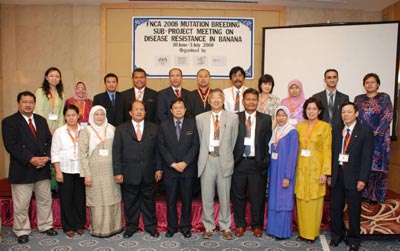 |
| The participants from 5 countries |
Opening Session
This Sub-Project Meeting began with the Welcoming Remarks by Dr. Rusli Ibrahim (Project Leader of Malaysia, Nuclear Malaysia), followed by the Opening Speech by Mr. Adnan Hj. Khalid (Senior Director, Nuclear Malaysia).
Special Lecture
Dr. Hitoshi Nakagawa (Project Leader of Japan) presented ‘Project Review of FNCA Mutation Breeding’ followed by a presentation from Dr. Rusli Ibrahim on ‘Activity of Mutation Breeding on Banana in Malaysia’.
And three Special lectures were presented as follows:
- ‘Save Banana from Viruses!’ by Prof. Dr. Keiko T. Natsuaki, Tokyo University of Agriculture, Japan.
- ‘Endophytic Microorganisms as Biocontrol Agents of Fusarium wilt’ by Prof. Dr. Sariah Meon, University Putra Malaysia, Malaysia.
- ‘Carbon Dioxide Enrichment for Enhancement of Plant Resistance’ by Prof. Dr. Madya Hawa Jaafar, University Putra Malaysia, Malaysia.
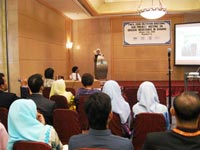 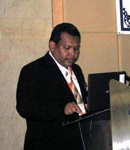 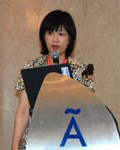
Final Report and General Discussion
Each participating country presented their final report. The points discussed are as follows;
- Sharing of markers for resistance genes against FOC, and BBTV among participating countries since exchanging of plant materials are not allowed.
- Publishing proceeding for FNCA Mutation Breeding of Banana and efficient protocols for disease screening (FOC, BBTV and Nematodes) that could be documented into manuals and be shared among member countries.
- Possibility to maintain mutant varieties in Japan. FNCA as the repository Agency.
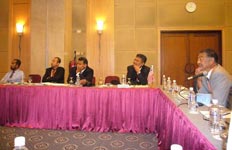
Future plans and evaluation of this Sub-Project were discussed and concluded as follows. And all participants agreed to extend this project until 2010 as Phase II towards achieving the final goal of obtaining resistant new varieties of banana. The Minutes were discussed and agreed by all participants. This will be reported at the FNCA 2008 Mutation Breeding Workshop to be held on 27-31 October, 2008 in Dalat City, Vietnam.
Conclusions
- All participating countries such as Philippines, Vietnam and Malaysia have successfully achieved the objectives of the project by identifying promising mutant lines which are disease resistant (BBTV, Fusarium and Nematode).
- Achievement from this project will be published as proceedings and protocols for irradiation and screening for Fusarium, BBTV and Nematode.
- As a new member of this sub-project of banana, Bangladesh can adopt all the disease screening methods developed by other participating countries.
- The protocol for anther culture of banana, developed by Bangladesh, can be adopted by other member countries.
Forum
Four special lectures were presented by Malaysian researchers as follows, and Panel Discussion was held by four panelists such as Dr. Nakagawa, Prof. Dr. Rofina Yasmin Othman, Prof. Dr. Norzulaani Khalid and Prof. Dr. S. Vikineswary.
- ‘Go bananas with tissue culture - from bench to market’ by Prof. Dr. Norzulaani Khalid, University of Malaya
- ‘Developing new molecular targets and approaches for control of fungal and viral diseases in bananas’ by Prof. Dr. Rofina Yasmin Othman, University of Malaya.
- ‘Biocontrol of Fusarium wilt-microbes the saviour’ by Prof. Dr. S. Vikineswary, University of Malaya
- ‘R-genes related to NBS-LRR in Musa’ by Dr. Azhar Mohamad, Malaysian Nuclear Agency
Technical Visits
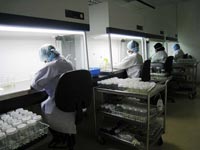
Participants made a technical visit to a commercial tissue culture laboratory, Jalur Lipur Sdn. Bhd. located at Serdang. The company is a relatively new and micropropagates plants such as banana, pineapple, mangosteen and a few medicinal plants. But their main activity is in the mass production of banana cv. Berangan which is mainly supplied to the Department of Agriculture (DOA) of Malaysia. The participants visit to various labs in their production line and also to their nursery. Then they moved to University of Malaya in Kuala Lumpur and their activities which was carried out by the Plant Technology Incubator Unit under the Centre for Research in Biotechnology for Agriculture (CEBAR) were introduced.
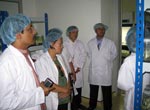 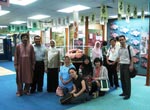 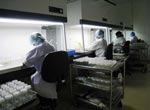
Minutes of
Sub-Project Meeting on Disease Resistance in Banana
June 30 - July 3, 2008
Kuala Lumpur, MALAYSIA
FNCA Mutation Breeding Sub-Project Meeting on Disease Resistance in Banana took place as follows:
Date: 30 June - 3 July 2008
Venue: Melia Hotel, Kuala Lumpur, Malaysia
Host Organizations:
- Malaysian Nuclear Agency. Ministry of Science, Technology and Innovation of Malaysia.
- Ministry of Education, Culture, Sport, Science and Technology (MEXT), Japan
Secretariat: NSRA
Participants: 1 each from the Philippines, Bangladesh and Vietnam, 2 from Japan, and 2 from Malaysia, total 7
(Please refer to Appendix V for the details).
Opening Session
The opening ceremony began with the Welcoming Remarks by Dr. Rusli Ibrahim, Course Director and FNCA Project Leader of Malaysia, Malaysian Nuclear Agency, who introduced the FNCA Project Leaders from all participating countries and speakers for special lectures, followed by the Opening Speech by Mr. Adnan Hj. Khalid, Senior Director (Management), Malaysian Nuclear Agency. The Opening Ceremony was highlighted by Mr. Adnan Hj. Khalid, the potential of banana as an important food crop as well as for downstream activities in South East Asian countries, particularly in Malaysia to increase farmers' income and export earnings, the importance of intensified research in nuclear technology and alternative methods of controlling pests and diseases to develop new and better varieties having commercial value added and collaborative networking among all FNCA participating countries for sharing of ideas and experiences. The opening ceremony was ended by the introduction of the participants and group photo session.
Session 1: Special Lecture 1
Dr. Golam Ahmed chaired the session. Dr. Hitoshi Nakagawa, Project Leader of Japan presented ‘Project Review of FNCA Mutation Breeding’ followed by a presentation from Dr. Rusli Ibrahim, Project Leader of Malaysia on ‘Activity of Mutation Breeding on Banana in Malaysia’. Three Special lectures were presented by Japan and University Putra Malaysia as follows:
- ‘Save Banana from Viruses!’ by Prof. Dr. Keiko T. Natsuaki, Tokyo University of Agriculture, Japan.
- ‘Endophytic Microorganisms as Biocontrol Agents of Fusarium wilt’ by Prof. Dr. Sariah Meon, University Putra Malaysia, Malaysia
- ‘Carbon Dioxide Enrichment for Enhancement of Plant Resistance’ by Prof. Dr. Madya Hawa Jaafar, University Putra Malaysia, Malaysia
Session 2: Final Report
Each participating country presented their final report. Summary and conclusion of the final reports presented are as follows:
- Presentation by Dr. Golam Ahmed, Bangladesh
In vitro mutagenesis work in ‘Sabri’ was initiated at the beginning of 2007 and within one and half year period a reproducible regeneration protocol from shoot tip explant and the optimal dose (LD50) for in vitro shoot tip culture was determined. Following this protocol a total number of 2664 M1V4 plants are now being screening against Fusarium wilt under greenhouse condition. Hopefully, it could be possible to select a commendable number of promising plants from this population for further evaluation in the infected field condition.
From the overall result it may be concluded that MS based medium is superior to N6 based medium in anther culture of banana. However, the frequency of anther response is very low. So it is needed to improve the efficiency of anther culture in banana by manipulating medium composition and/ or cultural conditions. The ultimate aim of this work is to regenerate plants from mutagenised gametic cells using anther culture of banana. So efforts will be made to regenerate plants from irradiated anthers.
- Presentation by Dr. Rusli Ibrahim, Malaysia
- In vitro plantlets of cultivar ‘Berangan’ have been micro propagated and multiplied in the lab up to M1V4 stage.
- Both treated tissue-cultured and control plants had been screened using ELISA Technique and found to be free from serious virus such as Banana Bunchy Top Virus (BBTV), Banana Streak Virus (BSV), Banana Mosaic and Banana Bract Mosaic
- To date, 1,115 irradiated cultivar ‘Berangan’ seedlings (2 months-old) have been successfully hardened/acclimatized in the nursery and were further screened against Fusarium disease in the farmer's field in July 2007.
- Treated plants were under observation for the performance against Fusarium wilt disease and selection for special agronomic traits such as early fruiting, dwarf and high yield (high bunch weight/tree).
- Malaysian Nuclear Agency has developed three methods of pre-screening for Fusarium wilt before seedlings were transferred and tested in the hot spot such as:
a) Soaking of root parts of in vitro plantlets in spore suspension of Fusarium oxysporium f. sp. cubense (FOC) with the concentration of 106 spores/ml for 2 hours. Observe for Fusarium infection such as yellowing of the leaves and blackening of the pseudostem.
b) Double-tray technique - inoculating in vitro plantlets which had been hardened in plastic tray for 3-4 weeks with spore suspension of FOC in the concentration of 106 spores/ml. Observe for Fusarium infection such as yellowing of the leaves and blackening of the pseudostem
c) Mutant plantlets were hardened in the nursery inside plastic tray containing media soil mixture for 3-4 weeks followed by inoculating with spores suspension of FOC in the concentration of 106 spores/ml. Observe for Fusarium infection such as yellowing of the leaves and blackening of the pseudostem
- Presentation by Dr. Olivia P. Damasco, Philippines
- BBTV virus resistance in banana cv ‘Lakatan’ was generated in M1 plants using gamma radiation and tissue culture.
- Resistance/tolerance reaction to BBTV was identified from radio-sensitivity (5-30 Gy) and bulk irradiation (20/25 Gy)(???).
- The stability of BBTV resistance traits was observed in G1 and G2 mutant lines in the field subjected to high disease pressure.
- The stability of BBTV resistance was observed in artificially inoculated lines under greenhouse conditions.
- Mechanism of resistance to BBTV could be due to non-preference of the aphids to the host plants
- Mutant G1 plants with resistance/tolerance to nematode R. similis were obtained.
- Agronomic and yield parameters of the G1 mutant lines were comparable to or even better than TC control plants.
- Presentation by Dr. Dang Trong Luong, Vietnam
Throughout all experiments, we had some conclusions: regeneration medium: MS + 0.5 ppm NAA + 3ppm BAP, rapid multiplication medium: MS + 0.5ppm NAA + 4ppm BAP, rooting medium: MS + 0.5ppm NAA + 0.2ppm IBA. Gamma treatment had some variations: change in height, the color of bud, leaf, and frequency variation from 1.8% to 12.5% at in vitro formula and from 7.5% to 15.7% at gamma mutagenic treatment formulas. The appropriate dose is 15 or 20Gy. The evaluation of disease resistance by artificial inoculation to banana plant in greenhouse was as follows. Spore density; at 105 spore/ml, we applied 4 inoculation methods to infect disease on banana. Among the 4 methods, a cultured hydroponic method reveals high infected percentage. We have obtained 17 banana lines with enhanced resistance to FOC disease in greenhouse (infected rates <25%). RAPD analysis showed that mutant lines exhibited genetic variations. The data of field trials showed two mutant lines were resistant to FOC disease
General Discussion
The points discussed are as follows;
- Sharing of markers for resistance genes against FOC, and BBTV among participating countries since exchanging of plant materials are not allowed.
- Publishing proceeding for FNCA Mutation Breeding of Banana and efficient protocols for disease screening (FOC, BBTV and Nematodes) that could be documented into manuals and be shared among member countries.
- Possibility to maintain mutant varieties in Japan. FNCA as the repository Agency.
Session 3: Round Table Discussion
Dr. Hitoshi Nakagawa chaired this session. Members of participating countries took turn to elaborate on their findings and achievements. Please refer to Appendix II (PDF25KB) for details.
Session 4: Forum
Dr. Rusli Ibrahim chaired this session. Four special lectures were presented by Malaysian researchers as follows:
- ‘Go bananas with tissue culture - from bench to market’ by Prof. Dr. Norzulaani Khalid, University of Malaya
- ‘Developing new molecular targets and approaches for control of fungal and viral diseases in bananas’ by Prof. Dr. Rofina Yasmin Othman, University of Malaya.
- ‘Biocontrol of Fusarium wilt-microbes the saviour’ by Prof. Dr. S. Vikineswary, University of Malaya
- ‘R-genes related to NBS-LRR in Musa’ by Dr. Azhar Mohamad, Malaysian Nuclear Agency
Panel Discussions:
The panelers were Dr. Hitoshi Nakagawa, Prof. Dr. Rofina Yasmin Othman, Prof. Dr. Norzulaani Khalid and Prof. Dr. S. Vikineswary. Points raised during the panel discussions were as follows:
- It is believed that R genes already exist in plants but are not expressed. Mutagenesis has the potential to create changes in the gene sequences that could trigger and express the R genes.
- When the plants are challenged, they response to it and R genes are triggered to be switched on.
- The response of the selected mutant lines on the field trials has yet to be determined as a result of disease response or resistance.
- Public awareness on GMOs in Malaysia is still low/little.
- Using gamma rays or ion beams for mutation breeding is simple but needs to be improved ie; establishment of efficient and easy screening methods or application of molecular techniques to enhance the viability of mutagenesis work.
- In mutagenesis work, it is critical to first determine the best mutant with precise phenotyping. Once identified, molecular techniques can be applied to confirm the genes related to the mutant traits or phenotypes. The identified genes can be used for further development and other mechanisms.
- Mutation breeding technique is regarded to be more practical for the improvement of banana and other vegetatively propagated crops in a short period of time than conventional and molecular breeding.
- Molecular breeding with the use of marker assisted system and other molecular techniques can be a supportive technology for banana improvement in the future. The whole system, however, requires sophisticated and expensive equipments and furthermore it takes longer time to achieve the final goal. Besides, the expertise from experienced plant breeders will be needed to select and evaluate the resistant plants in the field.
Session 5: Technical Visits
Participants made a visit to a commercial tissue culture laboratory, Jalur Lipur Sdn. Bhd. located at Serdang. It is a relatively new company as it was only established about 1 1/2 year ago. The company micropropagates plants such as banana, pineapple, mangosteen and a few medicinal plants. But their main activity is in the mass production of banana cv. Berangan which is mainly supplied to the Department of Agriculture (DOA) of Malaysia. Last year the company produced 1,000,000 ‘Berangan’ plantlets in polybags. The participants were brought to the various labs in their production line and also to their nursery by Ms. Marina, Laboratory Manager and Mr. Jamil, Field Manager.
The participants were brought to Malaysian Nuclear Agency for their lunch break and they were feasted with Malaysian traditional dishes and tropical fruits, such as durian, rambutan and bananas.
After lunch, Dr. Nakagawa, briefly visited and observed the facilities of Gamma Greenhouse with the assistance from Mr. Ahmad Zaki Hussein, Technical Officer from Malaysian Nuclear Agency. Then, all the participants were brought to visit University of Malaya in Kuala Lumpur. The participants were welcomed by Prof. Dr. Norzulaani Khalid and were brought around the campus. The first stop was at the Rimba Ilmu Museum where they exhibited many of Malaysia's flora and fauna collection. Then the participants were given briefing on the main activities of University of Malaya generally and the activities carried out by the Plant Technology Incubator Unit under the Centre for Research in Biotechnology for Agriculture (CEBAR). The visit ended at 5.00 pm and a short excursion was made to Kuala Lumpur City Centre (KLCC).
Cont. Session 3: Round Table Discussions
Future plans were discussed among participating countries and the points agreed upon can be referred to Appendix III (PDF10KB).
Participants discussed about the future and evaluation of the Sub-Project on Disease Resistance in Banana. The Minutes were discussed and agreed upon by all participants in the Meeting. This will be reported at the FNCA 2008 Mutation Breeding Workshop to be held on 27-31 October, 2008 at Centre of Applications of Nuclear Technique (VAEC), Dalat City, Vietnam.
Conclusions
- All participating countries such as Philippines, Vietnam and Malaysia have successfully achieved the objectives of the project by identifying promising mutant lines which are disease resistant (BBTV, Fusarium and Nematode).
- Achievement from this project will be published as proceedings and protocols for irradiation and screening for Fusarium, BBTV and Nematode.
- As a new member of this sub-project of banana, Bangladesh can adopt all the disease screening methods developed by other participating countries.
- The protocol for anther culture of banana, developed by Bangladesh, can be adopted by other member countries.
Recommendations
All participating countries agreed to extend this project until 2010 as Phase II towards achieving the final goal of obtaining resistant new varieties of banana based on the following reasons:
Philippines
- already identified 5 promising mutant lines of variety ‘Lakatan’ which are resistant to BBTV and will screen for multi location trials (farmer's plot) for 2 cropping seasons
- mutants will be registered for plant breeder's right as new varieties
- mutants will be propagated for commercialization
Vietnam
- already identified 2 promising mutant lines of variety ‘Tay’ banana which are resistant to Fusarium wilt
- will be screened for multi location trials at 2 sites (north and central)
- mutants will be propagated for production
Malaysia
- already identified 3 promising mutant lines of variety ‘Berangan’ banana which are resistant to Fusarium wilt with improved agronomic characters such as early flowering, dwarf and high yielding
- will be screened for multi location trials at 3 sites for 2 cropping season (in collaboration with commercial plantations)
- mutants will be registered and micro-propagated for tissue culture plantlet production
Bangladesh
- will adopt mutation breeding technologies which has been established by other participating countries (Philippines, Vietnam, Indonesia, Malaysia) since Bangladesh just started the program last year in 2007
- Bangladesh has established a good protocol for anther culture which can be adopted by other participating countries
Appendix I - Workshop Program
Appendix II - Summary of Final Report (PDF25KB)
Appendix III - Future Plans (PDF10KB)
Appendix IV - Technical visit (pictures)
Appendix V - List of Participants
Program of
Sub-Project Meeting on Disease Resistance in Banana
June 30 - July 3, 2008
Kuala Lumpur, Malaysia
|
|
|
|
| 30 June 2008 |
|
|
| 9:00 |
: |
Registration |
| 9:30 |
: |
Opening Ceremony |
| |
|
Welcoming remarks |
- Dr. Rusli Ibrahim
Course Director/Project Leader
Of Malaysia |
| |
|
Opening Speech |
- En. Adnan Hj. Khalid
Senior Director (Management)
Malaysian Nuclear Agency |
| 9:40 |
: |
Group Photo and Refreshment |
| |
|
|
| |
|
Session 1 Special Lecture 1:
Chair : Dr. Golam Ahmed (Bangladesh) |
| 10:00 |
: |
Project Review of FNCA Mutation Breeding Project
Dr Hitoshi Nakagawa, Project Leader of Japan |
| 10:20 |
: |
Activity of Mutation Breeding on Banana in Malaysia
Dr. Rusli Ibrahim, Project Leader in Malaysia |
| 10:50 |
: |
Special Lecture 1: Save bananas from viruses!
Dr. Keiko Natsuaki, Japan |
| 11:30 |
: |
Special Lecture 2: Endophytic Microorganisms as Biocontrol Agents of Fusarium Wilt
Prof. Dr. Sariah Meon, University Putra Malaysia |
| 12:10 |
: |
Special Lecture 3: Carbon Dioxide Enrichment for Enhancement of Plant Resistance
Assoc. Prof. Dr. Hawa Jaafar, University Putra Malaysia |
| 12:50 |
: |
Lunch |
| |
|
|
| |
|
Session 2 Final Report
Chair : Dr. Hitoshi Nakagawa, Japan |
| |
|
Presentation per Country |
| 14:00 |
: |
Bangladesh - Dr. Golam Ahmed |
| 14:30 |
: |
Malaysia - Dr. Rusli Ibrahim |
| 15:00 |
: |
Philippines - Dr. Olivia Damasco |
| 15:30 |
: |
Break |
| 15:45 |
: |
Vietnam - Dr. Dang Trong Luong |
| 16:15 |
: |
Question and Answer |
| 16:30 |
: |
General Discussions about future activity |
| 17:00 |
: |
End of Day 1 |
| |
|
|
| 1 July 2008 |
|
| |
|
Session 3 Round Table Discussion
Chair : Dr. Hitoshi Nakagawa (Japan) |
| 9:00 |
: |
Preparation of final report |
| 10:00 |
: |
Tea Break |
| 10:30 |
: |
Preparation of final report (cont.) |
| 12:30 |
: |
Lunch |
| |
|
|
| |
|
Session 4 Forum -Special Lecture from Malaysia and Panel Discussions-
Chair : Dr. Rusli Ibrahim (Malaysia) |
| 14:00 |
: |
Go Bananas with tissue culture - from bench to market
Prof. Dr. Norzulaani Khalid, University of Malaya |
| 14:30 |
: |
Developing new molecular targets and approaches for control of fungal and viral diseases in bananas
Prof. Dr. Rofina Yasmin Othman, University of Malaya |
| 15:00 |
: |
Tea Break |
| 15:20 |
: |
Biocontrol of Fusarium witl - microbes the savior
Prof. Dr. S. Vikineswary, University of Malaya |
| 15:50 |
: |
R-genes related to NBS-LRR in Musa
Dr. Azhar Mojamad, Malaysian Nuclear Agency |
| 16:20 |
: |
Panel Discussions
- Dr. Hitoshi Nakagawa (IRB)
- Prof. Dr. Rofina Yasmin Othman (UM)
- Prof. Dr. Norzulaani Khalid (UM)
- Prof. Dr. S. Vikineswary (UM) |
| 17:00 |
: |
End of day 2 |
| |
|
|
| 2 July 2008 |
|
| 9:00 |
: |
Technical Visit 1: Commercial Tissue Culture Laboratory - Jalur Lipur Sdn. Bhd., Serdang |
| 12:30 |
: |
Lunch |
| 14:00 |
: |
Technical Visit 2: University of Malaya, Kuala Lumpur |
| |
|
|
| 3 July 2008 |
|
|
|
|
Continue of Session 3 : Round Table Discussion
Chair : Dr. Hitoshi Nakagawa (Japan)
|
| 9:00 |
: |
Reflection and vista of future |
| 10:30 |
: |
Tea Break |
| 10:45 |
: |
Evaluation of Sub-project on Disease Resistance of Banana |
| 12:30 |
: |
Lunch |
| 14:00 |
: |
Drafting minutes and wrap up |
| 15:30 |
: |
Tea Break |
| 15:45 |
: |
Adoption of minutes |
| 16:30 |
: |
Closing |
| 17:00 |
: |
End |
List of Participants
Sub-Project Meeting on Disease Resistance in Banana
June 30 - July 3, 2008
Kuala Lumpur, Malaysia
No. |
Country |
Name/Designation |
| 1. |
BANGLADESH |
Dr. Golam Ahmed
Principal Scientific Officer
Institute of Food and Radiation Biology, AERE,
Bangladesh Atomic Energy Commission |
| 2. |
JAPAN |
Dr. Hitoshi Nakagawa
Director
Institute of Radiation Breeding (IRB)
National Institute of Agrobiological Sciences (NIAS) |
| 3. |
JAPAN |
Dr. Keiko Natsuaki
Professor
Faculty of International Agriculture and Food Studies
Tokyo University of Agriculture |
| 4. |
MALAYSIA |
Dr. Rusli Ibrahim
Manager
Industrial Crop Group
Agrotechnology and Biosciences Division
Malaysian Nuclear Agency |
| 5. |
MALAYSIA |
Dr. Azhar Mohamad
Research Officer
Industrial Crop Group
Agrotechnology and Biosciences Division
Malaysian Nuclear Agency |
| 6. |
THE PHILIPPINE |
Dr. Olivia Damasco
Professor
Plant Pathology Laboratory
Institute of Plant Breeding (IPB)
University of the Philippines at Los Banos (UPLB) |
| 7. |
VIETNAM |
Dr. Dang Trong Luong
Head
Genetics and Upland Crop Breeding Dept.
Agricultural Genetic Institute
Ministry of Agricultural and Rural Dev. |
*** MALAYSIAN NUCLEAR AGENCY ***
| Patron |
| Datuk Dr. Daud Mohamad |
| Advisor |
| Dr. Nahrul Khair Alang Md. Rashid |
| Chairman |
| Dr. Wan Manshol Wan Zin |
| Course Director |
| Dr. Rusli Ibrahim |
| Secretariat |
Dr. Azhar Mohmad
Dr. Sobri Hussein
Norazlina Noordin
Alvina Lindsay Mijen
Salahbiah Abdul Majid
Everina Nuri |
| Event Management (Training Centre) |
Zuhaira Hashim
Mariatulkhibtiyah Noor |
|
|